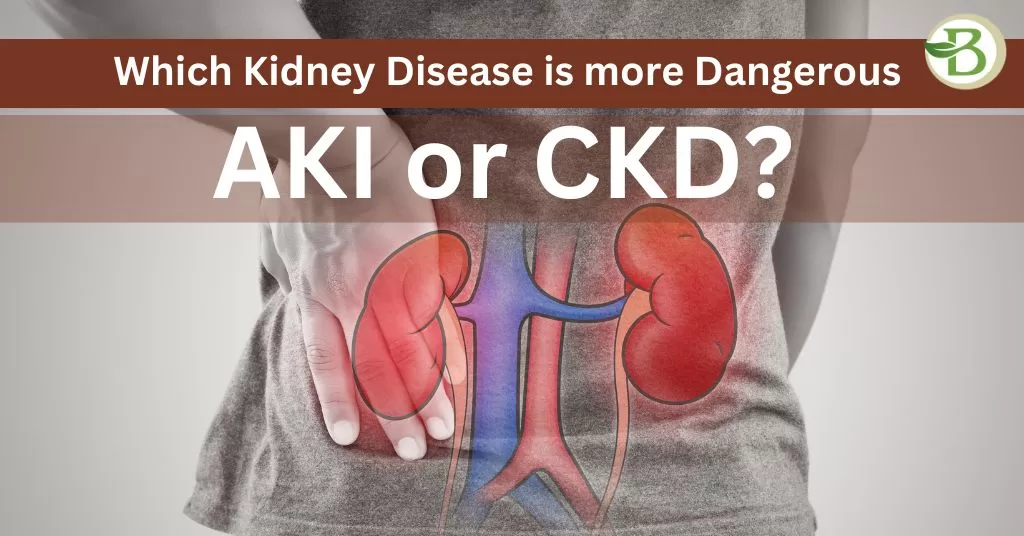AKI vs. CKD: Understanding the Risks to Your Kidneys
Our kidneys work tirelessly in the background to keep us healthy. Despite their small size, these organs play a vital role in filtering waste, controlling fluid balance, and ensuring our well-being. But what happens if they start malfunctioning? Conditions like Acute Kidney Injury (AKI) and Chronic Kidney Disease (CKD) can put our health in danger. In this blog, we’ll examine the differences between AKI and CKD to recognise which poses a greater threat.
Acute Kidney Injury (AKI): The Sudden Strike
AKI is like a surprise storm that strikes out of nowhere. It’s like a momentary shutdown of the kidney’s filtration mechanism, commonly triggered by severe infections, dehydration, or specific medications. AKI can occur swiftly, sometimes within hours, and it calls for immediate medical intervention. If left untreated, AKI can give rise to complications like imbalances in electrolytes, fluid retention, and even permanent renal damage.
Chronic Kidney Disease (CKD): The Silent Threat
Conversely, Chronic Kidney Disease (CKD) is similar to a gradual and consistent decline. It is a chronic condition in which the kidneys slowly decline in function over time. CKD typically advances silently, with symptoms only becoming noticeable in the later stages of the disease. Diabetes, high blood pressure, and specific genetic conditions are common factors contributing to CKD. If not managed properly, CKD can advance to renal failure.
Understanding the Differences
So, which one is more dangerous? The answer isn’t straightforward because AKI and CKD have different characteristics and risks.
- Speed of Onset: AKI can develop quickly and come on without warning, requiring immediate medical care. Conversely, CKD progresses gradually over months or years, sometimes showing no symptoms until the advanced stages of the disease.
- Reversibility: If AKI is detected early enough and treated quickly, it could potentially be recovered. However, CKD is typically hard to reverse and requires long-term care to decrease its progression.
- Consequences in the Long Run: If left untreated, AKI and CKD can both result in significant consequences. AKI survivors may eventually develop CKD, which further raises the risk of anaemia, cardiovascular disease, and other health issues.
Complications of AKI:
Acute kidney injury complications can vary depending on the severity and underlying cause. Here are some potential risks:
- Fluid accumulation: Acute kidney failure may cause the body to retain excess fluid due to the renals’ inability to filter and excrete it properly. This can lead to swelling, breathlessness, and increased blood pressure.
- Chest discomfort: If the lining around your heart (pericardium) gets inflamed, you might experience pain in your chest.
- Lack of muscle strength: Muscle weakness can occur when your body’s blood chemistry—its fluids and electrolytes—is out of balance.
- Severe organ harm: AKI leads to abrupt loss of kidney function, followed by end-stage renal disease.
- Other complications: Acute kidney injury can also increase the risk of developing other health problems, such as infections, cardiovascular diseases, and even chronic kidney disease, if not appropriately managed.
It is important to promptly diagnose and treat AKI to minimise the risk of these consequences of acute kidney injury.
Complications of CKD:
Complications of chronic kidney disease can include:
- Hypertension: One of the most harmful effects of CKD is high blood pressure, which is thought to hasten the deterioration of renal function.
- Anaemia: Another consequence is anaemia, which happens when the renals fail to generate enough red blood cells, resulting in fatigue and weakness.
- Bone disease: CKD can also cause bone disease, as the kidneys are responsible for maintaining the body’s calcium and phosphorus levels. When the kidneys do not function correctly, the bones weaken, increasing the risk of fractures.
- Fluid retention: Another common CKD challenge is fluid retention, which occurs when the kidneys cannot adequately eliminate extra fluid from the body. This may result in swelling around the eyes, ankles, and legs.
- Mineral imbalance: Furthermore, chronic kidney failure can cause electrolyte abnormalities, such as elevated potassium levels in the blood. If ignored, this can result in cardiac arrest, irregular heartbeats, and muscular weakness.
- Gout: Gout is an inflammatory disease in which urate crystals accumulate in the body, particularly in the joints, causing pain and immobility. When the renals do not work properly, urate accumulates and gout increases.
Protecting Your Kidneys:
Regardless of whether you’re at risk of aki vs ckd, there are steps you can take to protect kidneys health:
- Stay hydrated: Sip plenty of water throughout the day to keep your renals working properly and wash away toxins.
- Control underlying medical conditions: Manage conditions such as diabetes and hypertension by taking medication, making lifestyle modifications, and scheduling routine examinations.
- Steer clear of nephrotoxic chemicals: If you have underlying renal disease, use caution when using drugs, supplements, and other substances that might damage your renals.
- Consume a nutritious diet: Keep your diet low in processed foods, saturated fats, and salt to promote kidney health in general.
- Get frequent check-ups: Schedule routine screenings and kidney function test with your healthcare practitioner to monitor your renal health and identify any issues early.
Conclusion
In the battle between AKI and CKD, there’s no clear winner regarding which is more dangerous. Both conditions can have serious repercussions if not treated effectively, highlighting the importance of renal health and proactive management. By understanding the dangers of kidney disease, the differences between AKI and CKD, and following the tips to keep kidney healthy, we can lower the risk of kidney damage and maintain our overall well-being. After all, our kidneys may be small, but they’re very important – let’s give them the care they deserve!
Treatment:
Want a natural kidney disease treatment or kidney failure treatment without dialysis? Look no further than Homoeopathy, a natural, safe, and effective treatment alternative. As the country’s number one choice for homeopathic treatment, Bharat Homeopathy is here to help with all your health needs.
Our dedicated team specialises in providing effective homeopathic treatments for various kidney-related conditions. Whether you’re dealing with AKI or CKD, we have the expertise and experience to help you find relief and improve your overall renal health.
At Bharat Homeopathy, we understand the importance of natural healing and strive to offer holistic solutions for renal ailments. Our homeopathic treatment for kidney failure is carefully tailored to address the root causes of the disease, aiming to restore bodily balance and stimulate natural healing abilities. With a focus on individualised care, our skilled homeopaths will assess your specific condition and develop a customised kidney treatment by homeopathy plan tailored to your individual needs.
With a reputation for excellence, Bharat Homeopathy is committed to providing our patients with the most satisfactory quality of care and kidney safety tips. Our state-of-the-art facilities and advanced treatment methods ensure you receive the best care for your kidney-related ailments. So, if you’re seeking a natural cure for AKI and CKD, trust Bharat Homeopathy to guide you on your path to better renal health.


